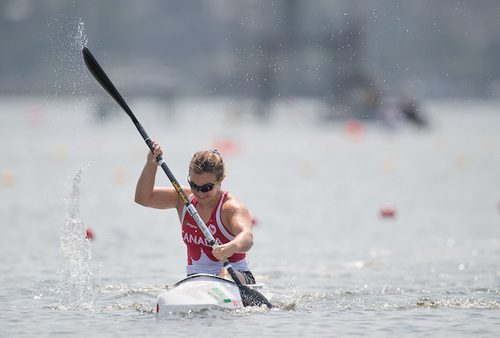RIO DE JANEIRO, Brazil —After 100 metres, Erica Scarff was looking at gold.
Crossing the finish line, a further 100 metres down the course and with six boats ahead of her, she was looking at the future.
At the Lagoa Rodrigo de Freitas course in Rio, Scarff finished in seventh place in the women’s KL3 paracanoe sprints, but was only 2.56 seconds behind gold medal winner Anne Dickins, 49, of Great Britain.
To challenge for a medal she will need to maintain her first-half speed throughout the race.
“I did have a good start,” Scarff said. “Even yesterday (in a preliminary) I had my best start ever but in that second half I just seem to fall behind. Hopefully, over the next few years I’ll work on maintaining the speed throughout the race.”
All in all, though, not bad for someone who has only been training full-time for a year, and in a sport with a steep learning curve.
Even her parents, Carmela and Ron of Mississauga, are surprised at the speed of her success, despite their daughter’s immediate comfort when she first sat in a boat.

Carmela and Ron a few hours before their daughter raced in her first Paralympics showing off the banner they made. Photo credit: Braydon Holmyard
“When she was no longer able to compete in gymnastics she dabbled a bit to find the sport that she liked,” Carmela said before Thursday’s race, standing near the “Go Erica Go” banner she hung from the stands.
“I wondered, ‘will she find something,’ but the first time she sat in a boat she knew right away that it was for her, she felt such freedom that she never felt in any other sport.”
Scarff had to have her leg amputated in January, 2009 just below her hip after being diagnosed with bone cancer, the same kind that Terry Fox battled.

Erica Scarff after a practice at Balmy Beach Canoe Club in Toronto’s Beaches neighbourhood. Photo credit: Still from a video shot by Melvin Gomez
Scarff’s journey to the Paralympics started in 2013 with a visit to Balmy Beach Canoe Club in Toronto.
On her first day, she simply watched the other paddlers from a motorboat with coach Mari Ellery. Shortly after, with Ellery guiding her, she started training three days a week, then six, and each year her coach was seeing more of her.
“Then, this year was really her first full year of training,” Ellery said in a telephone interview after the race. “She trained from September to now – six days a week, twice a day. She’s got one year under her belt of full training.”
The speed of her progress came as a pleasant surprise to Ellery.
“It’s exciting to see the growth and development in her, and this has come quite quickly, we didn’t think it was going to come until 2020,” Ellery said in an interview earlier this year before Scarff left for Rio. “Something this winter, she just developed so quickly and the learning curve has been fast.”
Scarff and her coach have a close relationship and despite Ellery staying home in Toronto, the two have been in constant contact since Scarff arrived in Rio. The mere mention of Ellery’s name brings a smile to Scarff’s face.
“I am really excited to talk to her,” Scarff said. “She wasn’t able to come unfortunately, but we’ve been keeping in contact over the phone, so yeah, I’m excited to see what she has to say about this morning.”
Distance wouldn’t stop the first time paralympian from connecting with her coach.
“Erica’s coach Mari is a teacher,” Carmela said. “So Erica phoned her at school yesterday and interrupted the classroom session and Mari came to the phone and they were able to debrief both races and come up with a plan for today.”
Ellery said she struggled with the idea of staying in Canada while Scarff was a continent away in the biggest race of her career.
“I really wish I was there so I could have coached her,” Ellery said from her school in Markham Ont. “We did speak on the phone last night and yesterday right after her race so I was able to give her some feedback on her race and some changes she could make for today.”

Coach Mari Ellery at Balm Beach Canoe Club in Toronto. Photo credit: Still from a video shot by Melvin Gomez
An emotional Ellery came close to tears on the phone as she explained how proud she is of Scarff and her confidence that the paddler will remain competitive for some time.
Ellery, 59, has coached at the Balmy Beach Canoe Club since she was in grade 10 and she feels confident that Scarff will be around for some time.
“I said this two years ago, she’s going to be the face of the game,” Ellery said. “And I don’t care if it’s in kayaking or what sport, it’s for Team Canada because she’s young, she works hard and she’s articulate.”
It isn’t just a selfish endeavour for the newly-turned 20 year old.
Ellery said that Scarff is part of AthletesCAN, a group that develops athlete leaders to influence policy and to serve as role models.
“I think she can advocate for para-sports and para-rights and she wants to develop the sport,” Ellery said. “She actually would come out with me and help coach after she finished her practice.”
With her event in Rio over, Scarff will be walking away with experience, a vital tool for athletes at this level.
“I think that, in the future, I’ll just make sure I maintain my focus,” Scarff said, still in her boat after the race. “I was really focused but, you know, I think I was really tired today so, maybe just more experience about how to race a good heat and a good semi so I’m not so tired for the final.”

